3 Section 4-3
4.3: Separable Prefix Verbs
You may not realize it, but English has several verbs that have a different meaning when an extra preposition is added to them. Compare the two examples below.
She is turning. VS He is turning the light off.
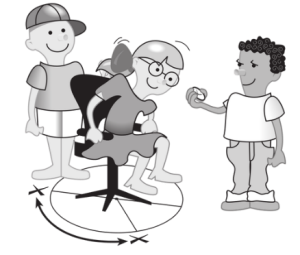

By adding the word “off” to “turn,” the meaning changes completely! English has several other verbs that do this.
The thief takes the wallet. VS The boy takes the shirt off.
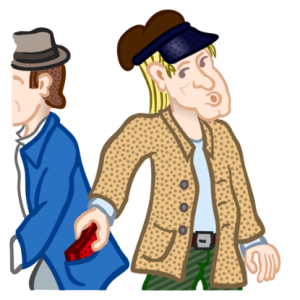

There are several verbs in English that work like this:
- to eat vs. to eat up
- to put vs. to put on
- to give vs. to give back
German also has verbs like this that add one small preposition or particle that completely changes the meaning. Compare.
machen—to do, to make VS aufmachen—to open


Er macht eine leckere Suppe. Er macht die Tür auf.
(He is making a tasty soup.) (He is opening the door.)
fangen—to catch (a→ä) VS anfangen—to start (a→ä)


Er fängt den Ball. Die Mathestunde fängt um 9 an.
(He is catching the ball.) (Math class starts at 9 o’clock.)
In their dictionary forms, the infinitive of separable prefix verbs will separate the prefix from the rest of the verb with a dot, like this:
-
- an·fangen—to begin, start
- auf·machen—to open
- zu·machen—to close
- auf·stehen—to get up, stand up
- mit·kommen—to come along, to come with
- an·kommen—to arrive
- vorbei·kommen—to come by
- zurück·kommen—to come back
- an·rufen—to call (on the phone)
- an·machen—to turn on
- aus·machen—to turn off
- kennen·lernen—to get to know
- auf·hören—to stop
- auf·räumen—to clean up (a dirty room, etc.)
- ab·räumen—to tidy up (a room, table, etc.)
Audio courtesy of Wikimedia user Jeuwre, Creative Commons Attribution-Share Alike 4.0 International. All ither audio clips of verbs in this chapter are also by Jeuwre, unless otherwise noted.
- an·fangen—to begin, start
However, in real life, books and other written material will not use the dot for the infinitive form.

Click to see me reteaching this:

While English isn’t as strict on word order, German ALWAYS kicks the separable prefix to the end of the sentence when it is conjugated.
- Wir kommen am Sonntag zurück. (We’re coming back on Sunday.)
- Word-for-word: (We’re coming on Sunday back.)
Once again, you may need to channel your inner Yoda to remember that German word order is a little different.

Here is the verb an·rufen conjugated in all forms. (The prefix
separates and migrates to the end of the sentence.)
- Ich rufe…an.
- Du rufst…an.
- Er/sie/es ruft…an.
- Wir rufen…an.
- Ihr ruft…an.
- Sie/sie rufen…an.

You can put as much German as you want between the conjugated verb and the prefix at the end of the sentence:
Katja steht immer morgens um vier auf.
(Katja steht blah blah blah blah auf.)
But ALWAYS kick  the prefix to the end when you conjugate a separable prefix verb.
the prefix to the end when you conjugate a separable prefix verb.

COMMON QUESTION: Hang on! What about the verb kennen·lernen? That looks like two verbs put together! I’m confused!!!
ANSWER: Yes, the verb kennen·lernen does have two verbs smashed together. But don’t panic! Treat it like any other separable prefix verb and kick the prefix to the end. In this case, it’s “kennen.” For example, Die Katze lernt den Hund kennen.
QUESTION: You mean I don’t have to conjugate both of them?
ANSWER: Nope. Just conjugate the last one, and that’s it.
ANOTHER QUESTION: Are there any other separable prefix verbs that look like two verbs put together?
ANSWER: Very few. One other example is the verb stehen·bleiben, which means to stay put or to remain standing.

Click to see me reteaching this part of the lesson:
Click to see me reteaching this part of the lesson:
Watch Easy German’s video to see lots of examples:
Watch YourGermanTeacher’s video to see the top 20 separable prefix verbs with examples and pictures:
EXTRA PRACTICE: Go to Germanzone.org’s site to do more practice with finding the infinitive of separable prefix verbs. As always, the site will grade your answers and give you feedback.
- https://www.germanzone.org/separable-prefix-verbs-1/
- https://www.germanzone.org/separable-prefix-verbs-2/
TIP: Whenever you see a new verb, make sure to check out the end of the sentence; there may be a separable prefix hiding at the end that will completely change the meaning of the verb.
FRAGE: Ab·räumen und auf·räumen both mean „ to clean,” right? So what’s the difference?
ANTWORT: Ab·räumen is used more in the sense of “to tidy up” or “to clear off.” Auf·räumen is used when more extensive cleaning is needed for a really dirty room or a messy house, i.e. shovel out the mess!


aufräumen abräumen
Ex. C: Alles über Sie! Beantworten Sie die folgenden Fragen in ganzen Sätzen.
- Wann fängt das Semester an? Wann fängt das Herbstsemester an? Wann fängt das Frühlingssemester an?
- Wann stehen Sie auf? Wann steht Ihr Mitbewohner/Ihre Mitbewohnerin auf?
- Wie oft räumen Sie Ihr Zimmer auf?
- Wie oft räumen Sie Ihr Auto ab?
- Rufen Sie Ihre Eltern an? Rufen Sie Ihre Großeltern an?
- Wir reisen im Sommer nach Europa. Kommen Sie mit?
Deutsche Musik. Listen to Franzi Harmsen’s song, Nie mehr (2021), to hear examples of some new separable prefix verbs.
Deutsche Musik. Listen to Es ist abend by AnnenMayKantereit (2022) to hear several examples of separable prefix verbs.
Ex. D: Beschreiben Sie die Szene. Using the following separable prefix verbs, write a sentence to tell what is happening in each picture. Feel free to add any necessary details.
Beispiel: 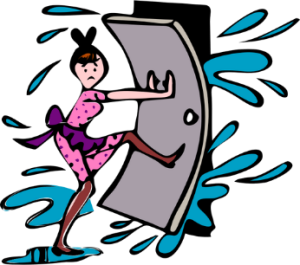
→Die Frau macht die Tür zu.
How to decipher the meaning of separable prefix verbs on your own:
Sometimes, you may be able to guess what a word means without looking it up. The prefix zurück, for example, will always mean “back” or “return.” You can combine it with just about any verb of motion.
- zurück·kommen—to come back
- zurück·bringen—to bring back
- zurück·laufen—to run back (a→ä)
- zurück·gehen—to go back
- zurück·fahren—to drive back (a→ä)
- zurück·fliegen—to fly back
Mit, with, is another prefix that you can use with just about any verb.
- mit·machen—to participate (do things WITH other people)
- mit·kommen—to come along, to come WITH
- mit·essen—to eat along with (e→i)
- mit·singen—to sing along with
- mit·fahren—to drive along with (a→ä)
Weg, away, can also be used with many verbs.
- weg·gehen—to go away
- weg·laufen—to run away (a→ä)
- weg·werfen—to throw away (e→i)
- weg·fliegen—to fly away
- weg·fahren—to drive away (a→ä)
Watch Easy German’s videos to see more examples of separable prefix verbs and how to decipher them. As always, you may see more words than you have learned yet in this textbook, but don’t worry about that.
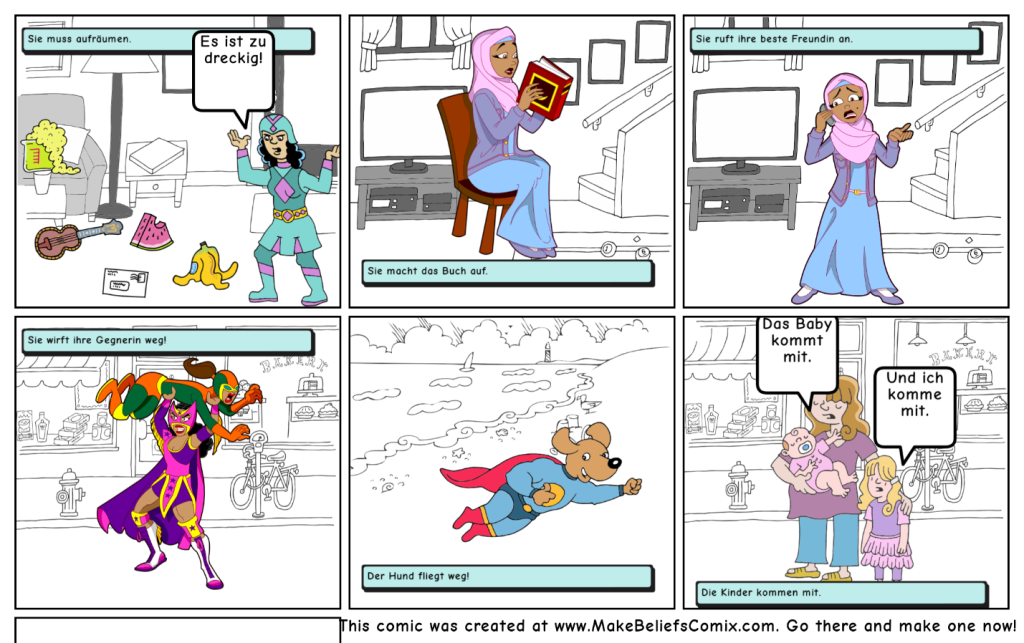
Ex. E: Übersetzen Sie ins Englische!
- Wann fängt das Konzert an?
- Morgen räumen wir die Wohnung auf.
- Unsere Freunde kommen manchmal abends vorbei.
- Wir kochen heute Käsespätzle. Isst du mit?
- Viele Leute recyceln nicht. Sie werfen alles weg.
- Kommt Martina mit oder bleibt sie zu Hause?
- Wir fahren nächste Woche zurück.
- Die Kätze läuft immer weg.
- Es ist zu heiß. Ich mache das Fenster auf.
- Mein Vater macht jeden Tag um 5 Uhr den Fernseher an.
- Morgen ist der Karaokeabend in Stuttgart. Singst du mit?
Watch Learn German’s video to see another review on separable prefix verbs.
Separable Prefix Verbs: What to do when there’s a modal verb or a helping verb
In real life, you will use separable prefix verbs in a variety of forms. You will combine them together with modal verbs and helping verbs, such as werden, to form the future tense. Check out the examples below.
- Es ist schon acht Uhr. Du musst aufstehen! (modal + infinitive)
- Kannst du die Tür bitte aufmachen? (modal + infinitive)
- Dessa möchte Harry Styles kennenlernen. (modal + infinitive)
- Ich werde nächste Woche vorbeikommen. (werden + infinitive)
Ex. F: Was müssen Sie machen? Using modal verbs and the future tense, describe your plans for this week. If you have forgotten the conjugations of modal verbs, look back to Chapter 3 for a review. Some suggestions are below in the boxes.
Beispiel: Ich muss das Fenster aufmachen. Du sollst den Müll wegwerfen...usw.
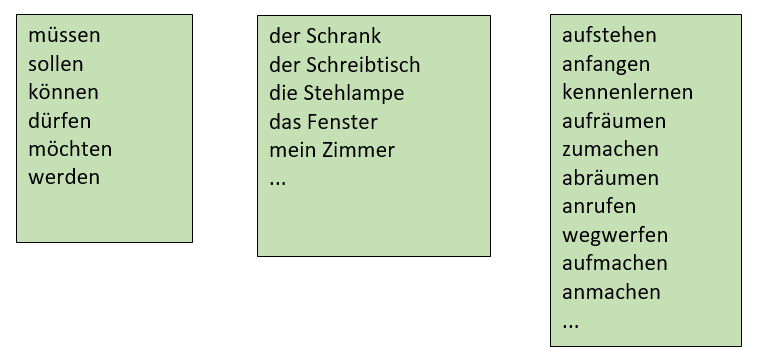
Separable Prefix Verbs in the Imperative
In Chapter 3, you learned how to make commands by using the imperative form of the verb. Here is a quick review using the verb kommen.

To make a command with a separable prefix verb, you will form the command from the main verb as usual. Then kick the prefix to the end.
Beispiel: zu·machen as a du-command
Step 1: Make a command with “machen”→mach
Step 2: Kick the separable prefix to the end→mach…zu.
Beispiel: zu·machen as an ihr-command
Step 1: Make a command with “machen”→macht
Step 2: Kick the separable prefix to the end→macht…zu.
Beispiel: zu·machen as a Sie-command
Step 1: Make a command with “machen”→machen Sie
Step 2: Kick the separable prefix to the end→machen Sie…zu
Beispiel: zu·machen as a wir-command
Step 1: Make a command with “machen”→machen wir
Step 2: Kick the separable prefix to the end→machen wir…zu
- Mach das Buch zu! Close the book!
- Macht den Kühlschrank zu! Close the refrigerator!
- Machen Sie das Fenster zu! Close the window!
- Machen wir die Tür zu! Let’s close the door!

Ex. H: Übersetzen Sie ins Deutsche!
- You should come by tomorrow.
- Go away!
- We get up every morning at 7.
- When are you coming back?
- Someone is cleaning up the kitchen.
- We’re playing soccer tomorrow. Are you participating?
- The birds are flying away.
- -Call me tomorrow. -I can’t; I’m flying back tomorrow.
- Bring back my car!
Listen to die toten Hosen’s song, Steh auf, 2002, which has examples of separable prefix verbs in the imperative:
Songtext: https://genius.com/Die-toten-hosen-steh-auf-wenn-du-am-boden-bist-lyrics
Ex. I: Gespräch. Lesen Sie das Gespräch und beantworten Sie die Fragen in ganzen Sätzen.
Lena: Das Semester fängt nächste Woche an. Ich bin froh, dass wir endlich eine WG gefunden haben.
Veronika: Ja, aber mein Zimmer ist ziemlich dreckig. Ich muss es sofort aufräumen.
Lena: Ich komme mit und helfe dir. Boah, der letzte Mieter war nicht so ordentlich. Soll ich die Papiere wegwerfen?
Veronika: Ja, bitte. Es stinkt wie die Pest. Ich mache das Fenster auf.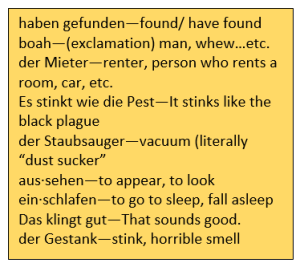
Lena: Ich hole den Staubsauger. Ich komme gleich zurück.
(15 Minuten später)
Veronika: Du kannst den Staubsauger jetzt ausmachen. Es sieht viel besser aus.
Lena: Ich bin aber müde. (Lies down on floor). Ich schlafe gleich ein.
Veronika: Hör auf, Lena. Es ist Zeit zum Mittagessen! Du isst mit, oder?
Lena: Ja, natürlich.
Veronika: Gut, dann steh auf und komm mit. Wir rufen die Pizzeria an und bestellen eine große Pizza.
Lena: Das klingt gut!
- Was für ein Problem gibt es?
- Was machen Lena und Veronika?
- Was macht Veronika gegen den Gestank?
- Was wirft Lena weg?
- Wer benutzt den Staubsauger?
- Was bestellen Lena und Veronika zum Mittagessen?
- Wie oft räumen Sie Ihr Zimmer ab?
EXTRA PRACTICE: Go to Germanzone.org’s website to try some extra practice with separable prefix verbs.
https://www.germanzone.org/separable-prefix-verbs-3/
Now try Dr. Claudia Kost’s activity to build sentences with all the types of verbs you’ve learned so far: regular, stem-changing, and separable prefix verbs.
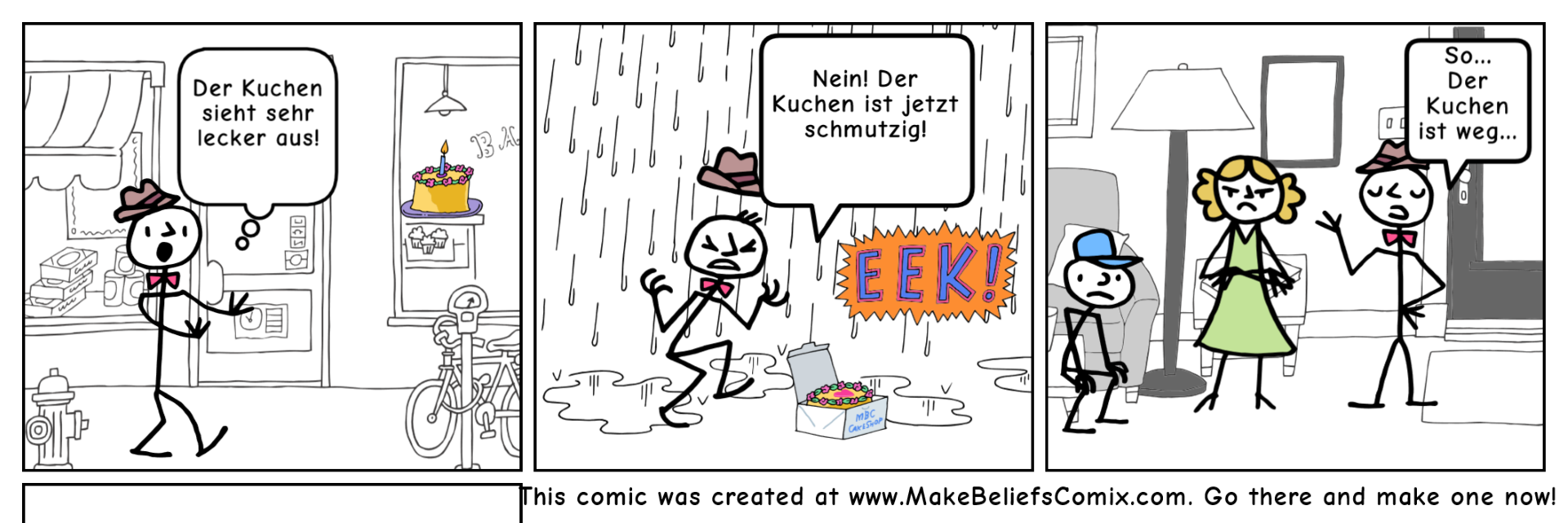
Review: We’ll be doing a new set of pronouns in the next section. Review the accusative pronouns with this activity to help you prepare for the next section. (Courtesy of Claudia Kost & Crystal Sawatzky, University of Alberta.)
Ex. J: Nicos Weg. Episode 30: Tageszeiten. Watch episode 30 and do the online activities. You will do another review on telling time. You will also practice several of the separable prefix verbs that you just learned.
https://learngerman.dw.com/en/tageszeiten/l-37445884
Ex. K: Nicos Weg. Episode 31: Am Sonntag koche ich. Watch episode 31 and do the online activities. You will hear several separable prefix verbs. You will also review the days of the week which you learned in Chapter 1.
https://learngerman.dw.com/en/am-sonntag-koche-ich/l-37452061#
Ex. L: Sie haben das Wort! Using separable prefix verbs, finish the comics below with your own touch.

German Games. If you like learning and reviewing vocabulary while playing games, this site may be for you:






